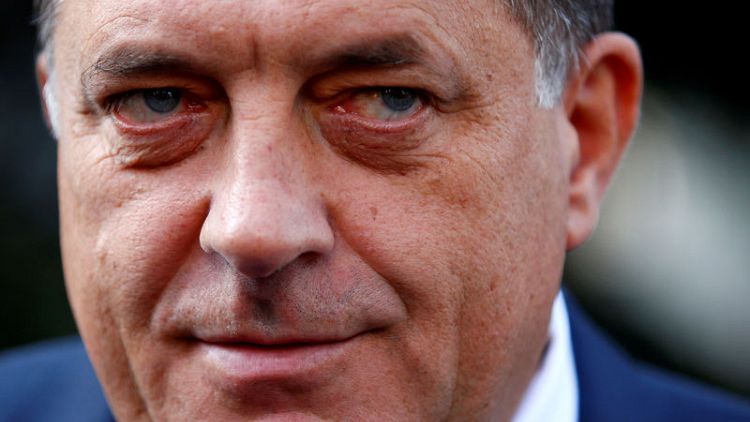By Gordana Katana
BANJA LUKA, Bosnia (Reuters) - The President of Bosnia's autonomous Serb Republic Milorad Dodik pushed on Monday to reopen debate over the 1995 Srebrenica massacre, less than three months before the country votes in elections.
Dodik launched a procedure demanding that parliament revoke a 2004 report issued by a previous government which established that Bosnian Serb forces killed about 8,000 Muslims in and around the town during the country's 1992-95 war.
Critics accused Dodik of trying to use the issue of Europe's worst atrocity since World War Two to win the votes of hardline Bosnian Serbs in the Oct. 7 general election.
Dodik has always rejected rulings by two war crimes courts -- The U.N. International Criminal Tribunal for the former Yugoslavia (ICTY) and The International Court of Justice -- that the atrocity qualified as genocide.
Though acknowledging the crime occurred, Dodik said the numbers of those killed had been exaggerated in the 2004 report.
A special session of parliament to debate the report will be held on Aug. 14, a parliamentary panel, which convened at Dodik's request, said on Monday.
Dodik said earlier that the report had been manipulated to harm the Serbs and that he wanted it overturned. Before this Srebrenica survivors sent to German authorities a list of Serbs alleged to have participated in the massacre, many of whom are still at large. Many Bosnians settled in Germany after the war, one of a series of conflicts as Yugoslavia broke up.
Bosnian Serb forces, led by General Ratko Mladic, took over the U.N.-protected enclave of Srebrenica on July 11, 1995. They separated men from women, detained them and killed them en masse in the following days.
Last year, the ICTY convicted Mladic of genocide and crimes against humanity, including at Srebrenica, and jailed him for life.
Bosnian Muslim deputies in the Serb Republic parliament condemned Dodik's initiative.
"The initiative ... is shameful when even the birds in the trees know what happened in Srebrenica. Dodik has no such eraser that can overturn the local and international rulings related to Srebrenica," one of them, Mujo Hadziomerovic, said.
Dodik, who seeks the secession of the Serb Republic from Bosnia, will run for the Serb seat in the country's inter-ethnic presidency in October.
Political analyst Tanja Topic said Bosnian parties in general were using such issues to win support. "This is a well-tried political recipe that the ruling parties have been using in their election campaign to mobilise voters around the nationalist agenda on the one side and to discredit their political opponents on the other," she told Reuters.
After the war, Bosnia was split into the Serb Republic and a federation of Muslim Bosniaks and Roman Catholic Croats, linked via a weak central government.
(Writing by Maja Zuvela; Editing by David Stamp)
